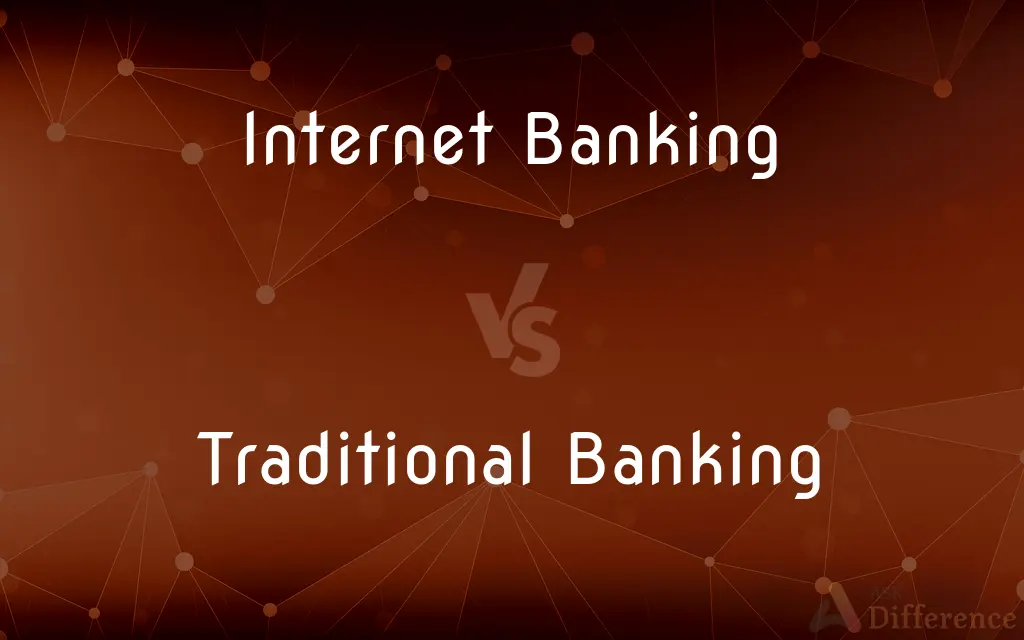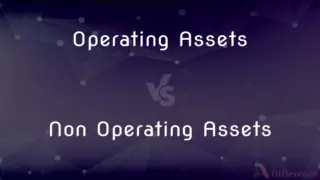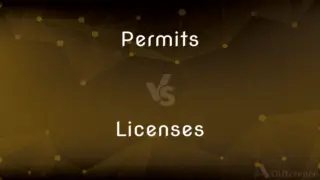Internet Banking vs. Traditional Banking — What's the Difference?
By Tayyaba Rehman — Published on October 15, 2023
Internet Banking allows customers to conduct banking activities online, while Traditional Banking involves in-person transactions at physical bank branches.

Difference Between Internet Banking and Traditional Banking
Table of Contents
ADVERTISEMENT
Key Differences
Internet Banking, often referred to as online banking, offers customers the convenience of accessing and managing their bank accounts remotely via the internet. It provides tools to check balances, pay bills, transfer funds, and more without visiting a physical branch. On the other hand, Traditional Banking operates through brick-and-mortar bank branches where customers interact face-to-face with bank personnel.
Internet Banking caters to the digital era, emphasizing speed, flexibility, and 24/7 accessibility. With the proliferation of smartphones and computers, it's become a preferred method for many due to its instant nature. In contrast, Traditional Banking relies on in-person interactions, providing a more personal touch, which some customers value, especially for complex transactions or services.
While Internet Banking is praised for its convenience, it does require a level of digital literacy and trust in online security measures. This form of banking also depends heavily on reliable internet connectivity. Traditional Banking, meanwhile, does not hinge on technology in the same way, offering tangible, physical spaces where transactions are conducted and documents can be immediately obtained or signed.
Security concerns differ between the two as well. Internet Banking necessitates robust cybersecurity measures to protect against online threats and fraud. Traditional Banking, while not immune to threats, primarily focuses on physical security, like vaults, guards, and surveillance systems.
Both Internet Banking and Traditional Banking have their advantages. The former is ideal for quick, routine transactions, while the latter offers a personal touch, often preferred for more intricate banking needs or by those less comfortable with technology.
ADVERTISEMENT
Comparison Chart
Mode of Access
Online via computers or mobile devices
Physical bank branches
Interaction
Digital, often without direct human interaction
Face-to-face with bank personnel
Availability
Typically 24/7
Limited to bank working hours and days
Dependency
Relies on internet connectivity and digital devices
Does not require any digital device
Security Concerns
Cybersecurity threats and online fraud
Physical security and in-branch fraudulent activities
Compare with Definitions
Internet Banking
Accessing banking services online.
She preferred Internet Banking for its 24/7 accessibility.
Traditional Banking
In-person financial transactions and consultations.
Traditional Banking provided him with personalized loan advice.
Internet Banking
Remote banking transactions through the internet.
Internet Banking made overseas transfers quick and easy.
Traditional Banking
Banking relying on face-to-face interactions.
She felt more secure depositing her savings in Traditional Banking.
Internet Banking
Online tools for financial management and transactions.
Thanks to Internet Banking, he spotted an unauthorized charge immediately.
Traditional Banking
Tangible banking outlets with direct human interaction.
For complex financial matters, he always trusted Traditional Banking.
Internet Banking
Management of bank accounts via digital platforms.
With Internet Banking, he could pay bills without leaving his home.
Traditional Banking
Banking services offered at physical branches.
She visited her Traditional Banking branch to open a new account.
Internet Banking
Digital alternative to in-branch banking.
Internet Banking alerts kept her informed about her account activity.
Traditional Banking
Brick-and-mortar locations for banking services.
He enjoyed the personal touch of his local Traditional Banking branch.
Common Curiosities
Can I open an account through Internet Banking?
Many banks allow account openings online, but some may require an in-branch visit for verification.
What is Internet Banking?
Internet Banking allows users to conduct banking activities online using digital devices.
Why might someone prefer Traditional Banking?
Some value the personal touch, face-to-face consultations, and tangible security of physical branches.
Are all banking services available online?
While many services are available online, some specialized services might necessitate an in-branch visit.
Does Traditional Banking offer digital tools?
Many traditional banks also offer online banking platforms for customer convenience.
Can I deposit cash through Internet Banking?
No, cash deposits typically require an ATM or in-branch visit.
How do I address disputes in Internet Banking?
Most banks offer customer service channels, like phone lines or chatbots, to address Internet Banking issues.
How does Traditional Banking operate?
Traditional Banking operates through physical bank branches with in-person interactions.
Is Internet Banking safe?
Yes, provided users follow security precautions and the bank implements robust cybersecurity measures.
What if I don't have reliable internet access?
Traditional Banking would be more suitable as it doesn't rely on internet connectivity.
How do banks ensure the security of Internet Banking?
Through encryption, multi-factor authentication, regular audits, and cybersecurity protocols.
How does Traditional Banking handle security?
Through physical measures like vaults, guards, surveillance systems, and in-branch protocols.
Can I use both Internet and Traditional Banking?
Absolutely, many customers use a combination of both based on their needs and convenience.
What's a key advantage of Internet Banking?
24/7 accessibility to conduct banking transactions is a significant advantage.
Do I need to be tech-savvy for Internet Banking?
Basic digital literacy is beneficial, but many platforms are user-friendly and offer assistance.
Share Your Discovery

Previous Comparison
Operating Assets vs. Non Operating Assets
Next Comparison
Permits vs. LicensesAuthor Spotlight
Written by
Tayyaba RehmanTayyaba Rehman is a distinguished writer, currently serving as a primary contributor to askdifference.com. As a researcher in semantics and etymology, Tayyaba's passion for the complexity of languages and their distinctions has found a perfect home on the platform. Tayyaba delves into the intricacies of language, distinguishing between commonly confused words and phrases, thereby providing clarity for readers worldwide.
















































